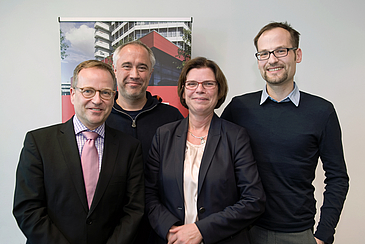Something in this fifth and final round of discussions is different: “Ms. Vogt has given us homework,” says Professor Jochen Zimmermann. The dean and presenter introduces his colleagues Professor Dirk Fornahl, head of the Center for Regional and Innovation Economics, and Torben Klarl, professor of macroeconomics, as discussion partners. They have all studied the 18-page paper on innovative economic policy in Bremen that Die Linke produced last autumn. Fornahl praises it first of all: “An excellent analysis. You haven’t forgotten innovative public procurement.”
Critique: “Conservative industrial policy”
What is innovative public procurement? It sounds very technical. Simply put, with this way of purchasing modern products and new technical solutions, state institutions have a lever to boost progress. But in the course of the discussion, the expert naturally also has some criticism, calling the concept “classical and potentially conservative industrial policy.”
“Nobody knows how concrete flows”
Kristina Vogt, who repeatedly emphasizes that she wants to discuss from a practical rather than theoretical point of view, gives the Bremen Senate a bad report. With its austerity policy, i.e. strict adherence to the debt brake, it has frittered away the structural change towards a service society. The Senate should have invested, especially at such a time of low interest rates. The leading politician from Die Linke underlines that “the framework conditions of international corporations cannot be controlled from Bremen.” Economic development has been exhausted in the development of industrial estates. The focus should have been on small businesses and services. Business startups should have received targeted support. “They need a financial boost if they can’t get the money from the bank.” But other measures could also be used, such as marketing support. Experts should have been kept on in administration instead of reducing staff. “There’s nobody left in the building department who knows how concrete flows,” she says.
“Nonspecialist contact persons”
According to Professor Fornahl, startups are the central element for innovative economic policy in Bremen. His colleague Professor Klarl explains how founders known to him personally were disappointed by Starthaus. Nonspecialist contact persons were not able to help. In addition, the Bremen administration is decades behind digitally. “What are you going to do?” he asks his guest.
Avoid “bureaucracy monsters”
Kristina Vogt lists a range of measures. These include joint, interdepartmental budget offices, an “innovation master plan,” and uncomplicated grant programs for smaller companies to help them with digital marketing. The politician believes it is very important for the state to decouple itself from federal and ERDF programs. “They’re bureaucracy monsters.” She wants to attract skilled workers with a special collective agreement. “Start with education policy. Something has to happen,” urges Klarl. The group agrees on the importance of this soft location factor. Finally, Zimmermann praises the guest – the discussion has been extremely solution-oriented, as opposed to ideology-oriented. A round of applause from the audience.

